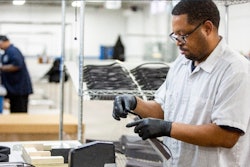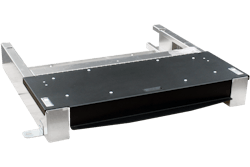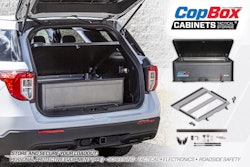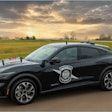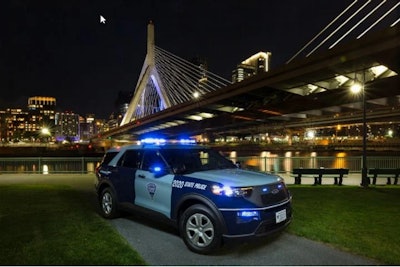 Massachusetts State Police has purchased 161 Ford Police Interceptor Utility hybrid vehicles for 2020.Photo: Massachusetts State Police
Massachusetts State Police has purchased 161 Ford Police Interceptor Utility hybrid vehicles for 2020.Photo: Massachusetts State Police
The Massachusetts State Police fleet consists of 3,100 vehicles, more than half of which are frontline patrol cars. Of these, 1,600 are Ford Police Interceptor Utility vehicles, and this year, the agency has ordered only the hybrid version of the PIU for its frontline patrol vehicles—161 vehicles, Sgt. PJ Fernandes for the fleet administration section confirmed.
Transitioning from Sedans to SUVs to Hybrids
Fernandes remembers the transition to SUVs from the Ford Crown Victoria sedan, which was discontinued in 2011. The agency obtained two of the new Police Interceptor Utility vehicles to test out.
“Back then the colonel at the time…we showed her it and her reaction to it was ‘how am I going to rationalize buying an SUV?’” Fernandes recalled. “That was the perception, that this big SUV would use a lot of gas [especially in comparison to] the Crown Vic, which was significantly cheaper.”
Now the SUV makes up the vast majority of the frontline fleet, and the agency is hoping to transition to the new PIU Hybrids when possible, ordering 161 hybrid versions this year. The agency usually buys about 350 vehicles each year—between 150 and 200 of these are frontline patrol vehicles.
The procurement budget—usually about $10 million—hasn’t changed in the past 15 years, meaning the number of vehicles the agency can purchase each year has decreased as vehicle prices have increased.
Fernandes said he does expect the hybrid version to reduce vehicle fuel costs, even if it doesn’t make up the approximate $8,000 difference the agency pays for this year's version, a refreshed model and a hybrid.
But he emphasizes that the purchase of the hybrids wasn’t a mandate.
“We are exempt from that right now, being a police agency, but as the world changes, we are going to be subjected to those. And this is just a way—call it perception, call it whatever you want—but we're buying hybrid cars, we're doing our part, we're trying to do it better,” he said.
As for potential maintenance costs, the hybrids currently in service only have up to 10,000 miles on them and haven’t required any heavy maintenance work yet, Fernandes said. It will be three or four years before he can determine if the hybrid vehicles are less costly to maintain.
Coronavirus Concerns
For the Massachusetts State Police, the priority during the COVID-19 crisis is keeping vehicles in service. Fleet staff members are considered essential employees, which means shops are open and fully functioning, Fernandes said.
"We have purchased alcohol sprayers to disinfect interior of vehicles before and after our mechanics service the vehicle. We are constantly updating our procedures based on day-to-day information to protect our mechanics and keep them safe," he added.
Since patrol vehicles are take-home vehicles, each trooper is responsible for cleaning his or her own car. They have guidelines for how to wipe them down.
Thi Dao is executive editor of POLICE sister publication Government Fleet.





